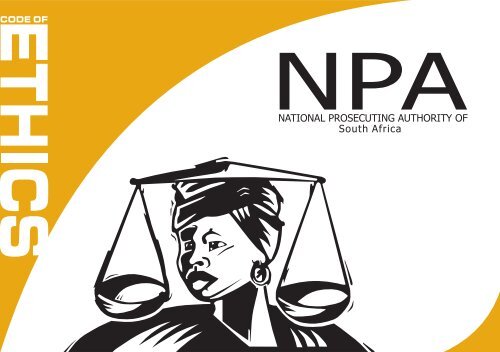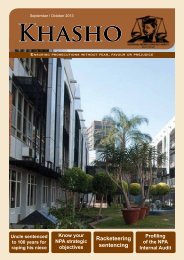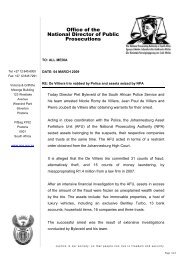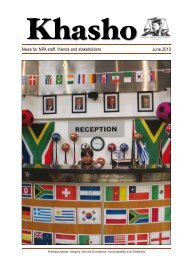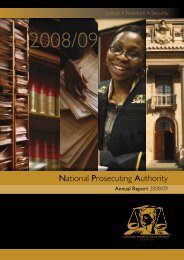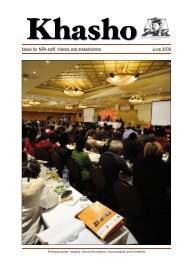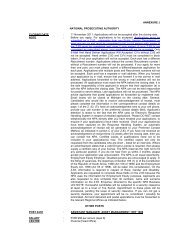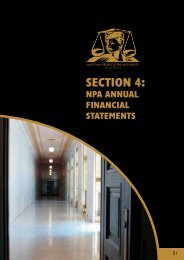NPA Code Of Ethics - National Prosecuting Authority
NPA Code Of Ethics - National Prosecuting Authority
NPA Code Of Ethics - National Prosecuting Authority
- No tags were found...
You also want an ePaper? Increase the reach of your titles
YUMPU automatically turns print PDFs into web optimized ePapers that Google loves.
Table of Contents<br />
ACKNOWLEDGEMENTS<br />
DISCLAIMER<br />
ABBREVIATIONS<br />
LEADERSHIP PLEDGE<br />
OUR VISION, MISSION AND CORE VALUES<br />
PURPOSE AND SCOPE OF OUR CODE<br />
WHY A CODE OF ETHICS<br />
TO WHOM DOES THE CODE APPLY<br />
ENFORCEMENT OF OUR CODE<br />
OUR VALUES<br />
ACCOUNTABILITY<br />
CREDIBILITY<br />
INTEGRITY<br />
PROFESSIONALISM<br />
SERVICE EXCELLENCE<br />
5<br />
5<br />
6<br />
4<br />
7<br />
9<br />
9<br />
10<br />
11<br />
12<br />
13<br />
14<br />
15<br />
18<br />
20<br />
2
ORGANISATIONAL RESPONSIBILITY<br />
USING THE <strong>NPA</strong> CODE OF ETHICS<br />
SEEKING GUIDANCE CONFIDENTIALLY<br />
REPORTING THEFT, FRAUD OR CORRUPTION<br />
CONFIDENTIALLY OR ANONYMOUSLY<br />
REPORTING OF UNETHICAL CONDUCT NOT RELATING TO<br />
THEFT, FRAUD, OR CORRUPTION CONFIDENTIALLY OR ANONYMOUSLY<br />
RESPONSIBILITY TO SEEK ADVICE OR TO REPORT<br />
MAKING ETHICAL DECISIONS THE PLUS FILTER<br />
STATEMENT OF PERSONAL RESPONSIBILITY<br />
21<br />
23<br />
24<br />
25<br />
27<br />
30<br />
32<br />
3
LEADERSHIP PLEDGE<br />
Dear Colleagues<br />
We as the <strong>NPA</strong> are mandated<br />
to ensure justice in our society,<br />
so that people can live in freedom<br />
and security. We are committed<br />
to the highest ethical and integrity<br />
standards in delivering justice to the people we<br />
serve, such that we are known to be an organisation<br />
of integrity. This code is our solemn promise<br />
to live the values that we have adopted as an<br />
organisation and adhere to the standards we have<br />
set ourselves on every action and decision we<br />
make at both organizational and individual level.<br />
We know that majority of us (our employees)<br />
and stakeholders always strive to conduct ourselves<br />
with integrity, and as such this code serves<br />
to reaffirm our commitment on what can be<br />
expected from us and what we expect from our<br />
stakeholders.<br />
This <strong>Code</strong>, together with other organizational<br />
specific policies, presents a guide to help you<br />
understand what is expected from you and how to<br />
live the <strong>NPA</strong> values. It also obligates all of us who<br />
witness any conduct that compromises or will<br />
compromise the integrity of the <strong>NPA</strong> to speak out.<br />
We ask you to become familiar with the meaning<br />
and the significance of this code of ethics.<br />
We (employees, stakeholders, partners,<br />
clients) all share the responsibility to operate<br />
within a uniform understanding of the core<br />
values on which our decisions and actions<br />
are based.<br />
Personally, I believe that personal commitment<br />
to live up to these values with passion<br />
and enthusiasm, will lead to a better organization<br />
as well as personal fulfillment.<br />
I personally commit myself to the <strong>NPA</strong> core<br />
organizational values and high integrity standards<br />
and appeal to each of you to do the same.<br />
Adv. Mokotedi Mpshe<br />
Acting <strong>National</strong> Director of Public Prosecutions<br />
4
ACKNOWLEDGEMENTS<br />
The process of developing this <strong>Code</strong> of <strong>Ethics</strong> could hardly have taken place without the dedication<br />
and the support of all <strong>NPA</strong> staff members. Various meetings and workshops have taken place throughout<br />
all the regions, where in valuable suggestions were provided. We wish to acknowledge your invaluable<br />
contribution in the development of this <strong>Code</strong>.<br />
It is important to take note of the fact that this <strong>Code</strong> of <strong>Ethics</strong> is intended to compliment the following<br />
documents:<br />
• <strong>Ethics</strong>: the practical guide to ethical code of conduct for members of the <strong>National</strong> <strong>Prosecuting</strong> <strong>Authority</strong><br />
• The code of conduct for members of the national prosecuting authority<br />
• <strong>Code</strong> of conduct for the public service<br />
Disclaimer<br />
While every effort is made to ensure that the information in this<br />
document is correct, it remains the responsibility of every staff<br />
member to stay abreast of the developments and to<br />
ensure that the information contained herein is<br />
correctly applied.<br />
5
ABBREVIATIONS<br />
CEO………………………..............................................Chief Executive <strong>Of</strong>ficer<br />
DPSA…….............................Department of Public Service and Administration<br />
IMU………………….................................…………..Integrity Management Unit<br />
NDPP……….......................................<strong>National</strong> Director of Public Prosecutions<br />
<strong>NPA</strong>……………………....................................…<strong>National</strong> <strong>Prosecuting</strong> <strong>Authority</strong><br />
The Constitution....................The Constitutions of the Republic of South Africa,<br />
Act 108 of 1996<br />
6
1<br />
OUR VISION, MISSION AND CORE VALUES<br />
VISION<br />
Justice in our society,<br />
so that people can live<br />
in freedom and security<br />
M<br />
IS<br />
SIO<br />
N<br />
Guided by the<br />
Constitution, we in the<br />
<strong>National</strong> <strong>Prosecuting</strong><br />
<strong>Authority</strong> ensure justice<br />
for the victims of crime<br />
by prosecuting without<br />
fear, favour or prejudice<br />
and by working with our<br />
partners and the public to<br />
solve and prevent crime.<br />
• Accountability<br />
• Credibility<br />
• Integrity<br />
• Professionalism<br />
• Service excellence<br />
A<br />
V<br />
LUE<br />
S<br />
7
OUR VISION, MISSION AND CORE VALUES<br />
Our vision provides us with the purpose and direction. It indicates the<br />
desired outcome of our efforts. Our mission is the roadmap to arrive at<br />
our vision and emphasizes our commitment to be proactive and<br />
preventative in handling crime. Our core values of accountability,<br />
credibility, integrity, professionalism and service excellence guide our<br />
behaviour and directly support our vision and mission.<br />
Values<br />
Our core values form the basis of our culture and reflect the standards of acceptable conduct<br />
in the <strong>NPA</strong>. They therefore form the foundation of what our stakeholders should expect of us<br />
and what we should expect of them.<br />
8
2<br />
PURPOSE AND SCOPE OF OUR CODE<br />
Why a <strong>Code</strong> of <strong>Ethics</strong><br />
This <strong>Code</strong> of <strong>Ethics</strong> is not only aimed at<br />
supporting our efforts directed at repositioning<br />
the <strong>NPA</strong> as it evolves in line with Strategy 2020,<br />
but also, and importantly so, at guiding our<br />
employees, our stakeholders, partners and<br />
clients in maintaining high standards of<br />
integrity. This <strong>Code</strong> of <strong>Ethics</strong> seeks to raise<br />
ethical awareness and minimise or eliminate<br />
ethical risk. It should be seen as your day to<br />
day guide to responsible personal<br />
and business decisions.<br />
At the <strong>NPA</strong> we are driven by our core values<br />
of Accountability, Credibility, Integrity,<br />
Professionalism and Service Excellence in all<br />
our organizational activities and<br />
transactions. These core values determine our<br />
organizational culture and reflect and<br />
support our commitment to live up to our vision.<br />
They provide guidelines for all our<br />
stakeholders and lay down the boundaries for<br />
responsible conduct so that all stakeholders<br />
know what to expect of the <strong>NPA</strong> and vice versa.<br />
It is the responsibility of each and every one<br />
of us to ensure that ethical decision-making<br />
becomes part of our day to day dealings with<br />
the people we serve and our fellow employees.<br />
This will in turn enable us to maintain public<br />
confidence in the integrity of the <strong>NPA</strong>.<br />
9
To whom does the <strong>Code</strong> apply<br />
This <strong>Code</strong> of <strong>Ethics</strong> applies to all <strong>NPA</strong> employees,<br />
stakeholders, partners and clients. It gives a clear<br />
indication of what is expected of us, both by the<br />
organization and other stakeholders. We expect<br />
our suppliers and contractors to become aware of<br />
our <strong>Code</strong>, comply with the values and principles<br />
in our <strong>Code</strong> and thereby help us to live up to these<br />
values.<br />
This <strong>Code</strong> of <strong>Ethics</strong> provides clear principles and<br />
conduct provisions (do’s and don’ts) to assist you<br />
with this. Should you be uncertain about what to<br />
do in any situation, you should ask for guidance<br />
or assistance through the appropriate channels<br />
and, where applicable, by referring to specific <strong>NPA</strong><br />
policies and procedures (refer to section 6.1 of this<br />
document).<br />
This <strong>Code</strong> of <strong>Ethics</strong> does not operate in isolation.<br />
This <strong>Code</strong> incorporates the principles enshrined<br />
in the South African Constitution, as well as all<br />
relevant statutes, corporate governance best<br />
practices, regulations, policies and procedures.<br />
It is the responsibility of all employees and other<br />
stakeholders to understand how to<br />
apply our core values to issues and decisions in<br />
the workplace.<br />
10
3<br />
ENFORCEMENT OF OUR CODE<br />
Because we take our values seriously, we will<br />
take action against employees who do not abide<br />
by the conduct provisions this <strong>Code</strong>. As an <strong>NPA</strong><br />
employee you need to ensure that you are familiar<br />
with this <strong>Code</strong> of <strong>Ethics</strong>. Failure to comply with<br />
the <strong>Code</strong> or to report or take action in respect of<br />
unethical or illegal actions will be dealt with in<br />
accordance with the applicable disciplinary rules<br />
and procedures. In cases of serious infringements,<br />
this may lead to the termination of employment.<br />
Furthermore, if we encounter a supplier,<br />
contractor, customer or other stakeholder who<br />
refuses to embrace the principles and values<br />
contained in this <strong>Code</strong> of <strong>Ethics</strong>, we will carefully<br />
evaluate whether a relationship with that party<br />
can be maintained.<br />
Evaluation, monitoring and enforcement of ethics<br />
are crucial for a sustained ethical culture in the <strong>NPA</strong>.<br />
Our set of principles therefore serves as framework<br />
against which we can benchmark our behaviour to<br />
achieve higher standards of ethical practice by<br />
means of self evaluation. Monitoring of the <strong>NPA</strong>’s<br />
ethical organisational culture will be based on these<br />
principles. Compliance to the conduct provisions of<br />
these principles will be monitored, training will be<br />
provided, policies and procedures will be revised<br />
and transgressors will be reprimanded to ensure<br />
that ethical behaviour is enforced and maintained.<br />
11
4<br />
OUR VALUES<br />
Values cannot remain theoretical. We must embrace and live our values<br />
and express them in all our everyday activities. In the following section we<br />
clarify what our values mean in practice and we specify, through principles<br />
and conduct provisions, what we will do and what we will refrain from doing.<br />
These principles, conduct provisions and guidelines are not<br />
intended to be exhaustive, but we hope they provide<br />
sufficient clarity on what conduct is in line with our values.<br />
10 12
4.1 Accountability<br />
Accountability means that we are prepared to take responsibility for our own work, make<br />
commitments, find solutions and be accountable for the results by<br />
• Complying with all applicable laws, rules, • Accepting personal responsibility for our<br />
regulations, policies and this <strong>Code</strong> of <strong>Ethics</strong>; actions; and<br />
• Ensuring accurate reporting;<br />
• Protecting the <strong>NPA</strong>’s assets and records.<br />
4.1.1 Complying with all applicable laws, rules,<br />
regulations and policies<br />
We will<br />
a. Observe the letter and spirit of these<br />
documents;<br />
b. Observe and know all relevant national laws<br />
applicable to the mandate of the <strong>NPA</strong>; and<br />
c. Follow all internal policies and procedures,<br />
including the standards of conduct<br />
and performance as set out in this <strong>Code</strong> of<br />
<strong>Ethics</strong>.<br />
4.1.2 Ensuring accurate reporting<br />
We will<br />
a. Report accurately and honestly on our<br />
performance, achievements and prospects.<br />
4.1.3 Accepting personal responsibility for our<br />
actions<br />
We will<br />
a. Assume personal and professional ownership<br />
of our individual decisions<br />
and actions;<br />
b. Not blame others for our poor decisions and<br />
actions;<br />
c. Not make commitments on behalf of the <strong>NPA</strong><br />
for which we canno assume personal<br />
responsibility or on which we cannot personally<br />
deliver;<br />
and<br />
4.1.4 Protecting the <strong>NPA</strong>’s assets and records<br />
We will<br />
a. Avoid using the <strong>NPA</strong>’s property, assets,<br />
or equipment in an improper or<br />
wasteful manner, or for personal gain;<br />
b. Treat assets such as vehicles or equipment<br />
with care and respect;<br />
13
c. Treat the assets of our clients, suppliers,<br />
contractors and employees with care and<br />
respect;<br />
d. Store the <strong>NPA</strong>’s records in accordance with<br />
prescribed procedures; and<br />
e. Report immediately the theft, misuse or<br />
waste of company assets equipment or<br />
records.<br />
4.2 Credibility<br />
Credibility means that we are reliable, sincere<br />
and transparent in the manner we conduct<br />
ourselves by<br />
• Giving honest and impartial advice;<br />
• Maintaining the confidentiality of information;<br />
and<br />
• Protecting the <strong>NPA</strong>’s name and reputation.<br />
4.2.1 Giving honest and impartial advice<br />
We will<br />
a. Base opinion on all available relevant<br />
information;<br />
b. Evaluate information objectively;<br />
c. Not make assumptions based on gossip<br />
and rumours; and<br />
d. Evaluate only factual information.<br />
4.2.2 Maintaining the confidentiality of information<br />
We will<br />
a. Refrain from disclosing any confidential, secret<br />
or top secret information belonging to the <strong>NPA</strong>;<br />
b. Maintain confidentiality of information received,<br />
e.g. from informants; and<br />
c. Refrain from disclosing any information relating<br />
to personnel, such as employee salaries,<br />
medical status or personal circumstances,<br />
unless there is proper authorization from the<br />
employee or other legitimate parties.<br />
4.2.3 Protecting the <strong>NPA</strong>’s name and reputation<br />
We will<br />
a. Avoid using the <strong>NPA</strong>’s name or our status as<br />
an employee for purposes outside of work<br />
(for example seeking preferential treatment,<br />
such as to gain access to sporting or other<br />
informal social events or obtain a discount<br />
from an <strong>NPA</strong> supplier, when purchasing<br />
something for personal use, unless previously<br />
negotiated by the <strong>NPA</strong> on behalf of its<br />
employees).<br />
b. Avoid creating an impression that we are acting<br />
on the <strong>NPA</strong>’s behalf when this is not the case;<br />
c. Refrain from speaking to the media unless<br />
explicitly mandated to do so; and<br />
d. Conduct ourselves in the manner as set out<br />
in public Service policies and regulations<br />
pertaining to behavioral conduct<br />
14
.<br />
4.3 Integrity<br />
We consistently align our selves to, and comply with, The Constitution, the legislation and regulations, as well as<br />
the <strong>NPA</strong>’s vision, mission, core ethical values, strategy, policies and procedures. We will achieve this by<br />
• Treating others fairly and equally;<br />
• Being honest;<br />
• Avoiding actual and perceived conflicts of<br />
interest;<br />
• Responsibly conduct ourselves with regard to<br />
accepting and giving gifts and entertainment<br />
• Avoiding and combating dishonest and criminal<br />
conduct within our working environment.<br />
4.3.1 Treating others fairly and equally<br />
We will<br />
a. Respect the human rights, dignity and<br />
interests of colleagues, clients and<br />
suppliers;<br />
b. Promote and maintain fair labour practice<br />
through the provision of a<br />
healthy and safe environment;<br />
c. Refrain from engaging in business practices<br />
that are discriminatory in terms of race,<br />
gender, religion, marital status, sexual<br />
orientation and disabilities;<br />
d. Prevent employees from victimization in the<br />
workplace; and<br />
e. Provide accurate and objective evaluations<br />
of the performance of subordinates<br />
4.3.2 Being honest<br />
We will<br />
a. Always tell the truth – and tell it in such a<br />
manner that it does not create false<br />
impressions, mislead or deceive;<br />
b. Make every effort to keep any and all promises<br />
made to fellow employees, the <strong>NPA</strong>, suppliers,<br />
customers and other stakeholders;<br />
c. Avoid making any false or misleading statements<br />
to others who may rely on the accuracy and<br />
truthfulness of the information being provided;<br />
d. Conduct business with all stakeholders in a<br />
transparent manner;<br />
e. Not commit any crimes or illegal practices or<br />
actions<br />
15
.<br />
4.3.3 Avoiding actual and perceived conflicts of<br />
interest<br />
We will<br />
a. Declare any potential conflict of interest<br />
(such a conflict of interest could include<br />
directorships, significant shareholdings,<br />
part-time employment or the employment<br />
of family members);<br />
b. Refrain from having any interests which<br />
constitute a conflict of interest with the <strong>NPA</strong><br />
and its business, for example involvement<br />
in the day-to-day operation and decision<br />
making of a business or undertaking which<br />
supplies the <strong>NPA</strong> with goods or services.<br />
c. Inform the <strong>NPA</strong> that our spouse/partner<br />
and /or immediate family is involved in the<br />
day-to-day operation and decision making<br />
of a business or undertaking which supplies<br />
the <strong>NPA</strong> with goods or services.<br />
d. Refrain from tendering, in any capacity, for<br />
<strong>NPA</strong> business;<br />
e. Refrain from using our positions for<br />
personal gain or to advance the interests<br />
of family members, friends, or others with<br />
whom I have a personal relationship;<br />
f. Refrain from taking full-time or part-time<br />
outside employment without the prior, written<br />
approval of the executing authority of the <strong>NPA</strong>,<br />
i.e. the CEO or NDPP;<br />
g. Refrain from business interests outside the<br />
<strong>NPA</strong> that:<br />
• creates, or appears to create, a conflict of<br />
interest;<br />
• creates, or appears to create, an excessive<br />
demand on my time and that would deprive the<br />
<strong>NPA</strong> of my best efforts in performingmy daily tasks;<br />
• would interfere, or appear to interfere, with my<br />
objectivity;<br />
• would negatively impact on the reputation of the<br />
<strong>NPA</strong>;<br />
• would constitute the misuse of <strong>NPA</strong> equipment or<br />
facilities.<br />
For a detailed description of conflict of interest situations and disclosure<br />
mechanisms, please consult the <strong>NPA</strong> Guidelines on Remunerative Work<br />
and the DPSA Conflict of Interest Framework.<br />
16
.<br />
4.3.4 Responsibly conduct ourselves with regard to<br />
accepting and giving gifts and entertainment<br />
We will<br />
a. Honour <strong>NPA</strong> policies and guidelines regarding<br />
gifts by seeking authorisation in the prescribed<br />
manner;<br />
b. Contemplate the intent of the entity offering the<br />
gift to determine the motive;<br />
c. Declare and record all gifts received from<br />
external parties (i.e. Suppliers, contractors,<br />
customers, etc) as a result of employment with<br />
the <strong>NPA</strong>;<br />
d. Declare and record the offering or provision of<br />
business entertainment;<br />
e. Declare and record the offering, provision and/or<br />
acceptance of personal hospitalities such as<br />
tickets to local sporting or cultural events or<br />
conferences; and<br />
f. Refrain from giving gifts or promotional materials<br />
of any kind to other government officials.<br />
4.3.5 Avoiding and combating dishonest and criminal<br />
conduct within our working environment<br />
We will<br />
a. Refrain from committing crime and illegal activities<br />
b. Refrain from fraudulent conduct (wilful<br />
misrepresentation yielding undue gain) and<br />
report observed fraud;<br />
c. Refrain from corrupt conduct (such as bribery or<br />
giving/receiving kickbacks) and report observed<br />
corruption;<br />
d. Create a climate and opportunity to report<br />
irregularities without fear of victimization or<br />
retribution; and<br />
e. Report all violations of laws, rules, regulations,<br />
policies and this <strong>Code</strong>;<br />
f. Honour the whistle-blowing policy; and<br />
g. Take steps against criminals as guided by<br />
the Government’s regulatory framework.<br />
For a detailed description of “gifts” and our disclosure mechanisms,<br />
please consult the <strong>NPA</strong> policy on the Prevention and Combating of<br />
Corrupt Activities, as well as the <strong>NPA</strong> Guidelines for the Acceptance of<br />
Gifts.<br />
17
.<br />
4.4 Professionalism<br />
Professionalism means we deliver professional services and comply with the highest standards of<br />
service delivery by:<br />
• Executing our duties to the best of our<br />
abilities;<br />
• Working in unity as a team;<br />
• Valuing diversity; and<br />
• Refraining from any form of harassment, intimidation<br />
and discrimination<br />
4.4.1 Executing our duties to the best of our<br />
abilities<br />
We will<br />
a. Conduct our business according to<br />
appropriate and accepted professional<br />
standards of accuracy and completeness;<br />
b. Continually seek better and more efficient<br />
ways of performing our work;<br />
c. Carry out our duties with the skill and care to<br />
the best of our ability<br />
d. Take personal responsibility for improving<br />
our own skills<br />
4.4.2 Working in unity as a team<br />
We will<br />
a. Promote inter-departmental, inter-divisional<br />
and inter-personal cooperation;<br />
b. Not get involved in workplace politics or<br />
hidden agendas;<br />
c. Share successful means of enhancing<br />
efficiency or service quality with managers<br />
and fellow employees in order to improve the<br />
benefits derived from their use;<br />
d. Be punctual and reliable in order not to disappoint<br />
or embarrass our employer and fellowemployees;<br />
e. Apply our knowledge and skills in the best<br />
interest of the <strong>NPA</strong>;<br />
f. Assist fellow employees and other stakeholders<br />
to meet their obligations; and<br />
g. Refrain from any form of unfair discrimination<br />
based on gender, race, ethnicity or physical<br />
abilities.<br />
18
4.4.3 Valuing diversity<br />
We will<br />
a. Respect the cultures and traditions of all<br />
people;<br />
b. Respect the right to freedom of social,<br />
religious and political association;<br />
irrespective of social, political, racial, gender,<br />
sexual preference, ethnic or religious<br />
considerations, economic status or physical<br />
characteristics;<br />
c. Respect the inherent dignity of all people,<br />
deal justly, fairly and impartially with each<br />
individual, and<br />
d. Provide fair access to employment<br />
opportunities as governed by applicable<br />
regulatory requirements both in the letter<br />
and spirit deserved.<br />
At the time of finalizing this <strong>Code</strong> the <strong>NPA</strong> was still in the process of<br />
finalizing the Whistle-blowing policy. However, the Protected Disclosures<br />
Act, Act 26 of 2000 (www.info.gov.za/gazette/acts/2000/a26-00.pdf), sufficiently<br />
protects whistle-blowers from any form of victimization.<br />
4.4.4 Refraining from any form of harassment,<br />
intimidation and discrimination<br />
We will<br />
a. Remain courteous and respectful in all our<br />
dealings;<br />
b. Refrain from any form of conduct that may<br />
be understood as intimidation or harassment<br />
or the tacit approval of these (including among<br />
others sexual);<br />
c. Refrain from any form of victimization;<br />
d. Refrain from any form of unfair discrimination;<br />
e. Refrain from using offensive language,<br />
including profanity, blasphemy and other<br />
insensitive communications<br />
f. Create a climate and opportunities to voice<br />
genuine concerns about behaviours and<br />
decisions perceived to be intimidating,<br />
harassing and generally unethical; and<br />
g. Refrain from victimizing and intimidating<br />
whistle blowers<br />
For a detailed description of “sexual harassment”, please consult the<br />
<strong>NPA</strong> Sexual Harassment Policy<br />
19
.<br />
4.5 Service Excellence<br />
Service excellence means we are passionate about our work and do everything in our power to provide<br />
our clients with the best possible service by<br />
• Building a result-oriented culture; and<br />
• Providing exceptional client service.<br />
4.5.1 Building a result-oriented culture<br />
We will<br />
a. Demonstrate commitment and passion<br />
about our work;<br />
b. Act proactively to address challenges<br />
creatively and with confidence;<br />
c. Create and maintain an enabling environment<br />
for creativity and innovation<br />
d. Set result orientated goals for our selves<br />
e. Perform our duties to the best of our ability;<br />
and<br />
f. Be accessible to our clients<br />
4.5.2 Providing exceptional client service<br />
We will<br />
a. Seek long-term, mutually beneficial relationships<br />
with our clients;<br />
b. Responsibly consult with the clients’ to<br />
determine their needs;<br />
c. Conduct ourselves with the highest levels of<br />
integrity; and<br />
d. Treat all clients objectively, politely and<br />
without unmerited prejudice.<br />
e. Provide recourse for any bad service<br />
20
5<br />
ORGANISATIONAL RESPONSIBILITY<br />
In line with our values, the principles and provisions of this <strong>Code</strong>,<br />
the <strong>NPA</strong> as an organisation is committed to being loyal to every<br />
employee and to protecting their rights and interests.<br />
21
As an organisation and employer, the <strong>NPA</strong> therefore will<br />
a. Respect the dignity of every employee and other stakeholders;<br />
b. Respect the traditions and cultures of all our employees;<br />
c. Respect employees’ right to freedom of social, religious and political association;<br />
d. Consistently act justly, fairly and impartially;<br />
e. Honour the confidentiality of employee records;<br />
f. Recruit and promote fairly and in accordance with established labour laws and practices;<br />
g. Develop employees’ skills and competencies in accordance with organisational needs;<br />
h. Create a learning environment that will build the capacity of our employees to deliver excellent service;<br />
i. Communicate in an open, transparent, honest and timely manner;<br />
j. Prohibit any form of unfair discrimination, intimidation, harassment or victimization based on race, religion,<br />
gender, political conviction, sexual orientation or disabilities;<br />
k. Create a climate and opportunity to report irregularities and misconduct without fear of victimization or<br />
retribution;<br />
l. Maintain sound and fair labour practices;<br />
m. Provide a safe and healthy working environment; and<br />
n. Observe the letter and spirit of the principles enshrined in the Constitution.<br />
22
6<br />
USING THE <strong>NPA</strong> CODE OF ETHICS<br />
There will be times when you :<br />
• are uncertain whether actions or decisions you are considering are consistent with<br />
both the letter and spirit of this <strong>Code</strong> of <strong>Ethics</strong>.<br />
• suspect or believe you have observed unethical or illegal conduct.<br />
In both these instances the <strong>NPA</strong> provides mechanisms for you<br />
and other stakeholders that are both safe and effective. The<br />
whistle blowing policy and protected disclosures act protects<br />
you against any form of victimization in respect of grievances<br />
and complaints.<br />
At the time of finalizing this <strong>Code</strong> the <strong>NPA</strong> was still in the process of<br />
finalizing the Whistle-blowing policy. However, the Protected Disclosures<br />
Act, Act 26 of 2000 (www.info.gov.za/gazette/acts/2000/a26-00.pdf), sufficiently<br />
protects whistle-blowers from any form of victimization.<br />
23
.<br />
6.1 Seeking guidance confidentially<br />
There are many ways to obtain guidance:<br />
1. Approach a colleague or an Integrity<br />
Champion. He or she knows your work situation<br />
well and may be able to assist you confidentially.<br />
If you feel that you cannot do this for any reason, then:<br />
If you feel that you cannot do this for any reason, then:<br />
4. Speak to an official at Integrity Management<br />
Unit (IMU).<br />
2. Approach your line manager. He or she also<br />
knows your work situation well and may be able<br />
to assist you confidentially.<br />
In case of uncertainty, ask for advice and<br />
All managers and staff members are required to<br />
exercise strict confidentiality when dealing with<br />
ethical matters.<br />
If you feel that you cannot do this for any reason, then:<br />
3. Approach another manager. All managers are<br />
required to maintain the highest ethical standards<br />
and, as part of their responsibility, to guide<br />
employees in the application of this <strong>Code</strong> of<br />
<strong>Ethics</strong>.<br />
Confidentiality means that the person providing advice will not disclose<br />
any information without your permission, unless there is an overriding<br />
legal or ethical obligation to do otherwise.<br />
24
.<br />
6.2 Reporting theft, fraud or corruption confidentially or anonymously<br />
In terms of the Whistle Blowing Policy every <strong>NPA</strong> employee is obliged to report on acts<br />
of fraud, corruption, theft and maladministration. Failure to do so is a chargeable offence.<br />
If the issue involves theft, fraud or corruption:<br />
1. You may report issues of this nature to the IMU<br />
If you feel that you cannot do this for any reason, then:<br />
2. Report the issue via the <strong>NPA</strong> Service Delivery<br />
Hotline at 0800 212 580. This Service Delivery<br />
Hotline operates 24 hours and 365 days a year.<br />
All calls remain anonymous and confidentiality<br />
is also guaranteed.<br />
Important points:<br />
• You may report incidences of ethical lapses<br />
either confidentially or anonymously.<br />
• When reporting, clearly state:<br />
• Which alleged wrongdoing are you reporting;<br />
• Where and when (dates and times, if available)<br />
the alleged wrongdoing took place;<br />
• Who was involved in the alleged wrongdoing;<br />
• How the individual or firm committed the act;<br />
and<br />
• Why you believe the activity to be improper.<br />
• All personnel are required to deal with reports<br />
of unethical conduct with strict<br />
confidentiality.<br />
• Honesty and truthfulness should be exercised<br />
when reporting any incidence of ethical lapse.<br />
Any malicious reporting will result in disciplinary<br />
action being instituted against the perpetrator.<br />
Anonymity means that you must not reveal your<br />
identity when reporting unethical or illegal<br />
conduct. The person who is reporting<br />
anonymously is responsible for protecting his<br />
or her anonymity.<br />
6.3 Reporting of unethical conduct not related<br />
to theft, fraud or corruption confidentially or<br />
anonymously<br />
25
.<br />
You may refer to the Protected Disclosures Act,<br />
Act 26 of 2000, for more information on responsible<br />
and safe reporting of unethical conduct.<br />
Anonymity means that you must not reveal your identity<br />
when reporting unethical or illegal conduct. The person<br />
who is reporting anonymously is responsible for protecting<br />
his or her anonymity.<br />
26
.<br />
6.3 Reporting of unethical conduct not related to theft, fraud or corruption confidentially<br />
or anonymously<br />
You should report observed conduct that is inconsistent with the letter and spirit of the <strong>NPA</strong> <strong>Code</strong> of <strong>Ethics</strong> by<br />
following the suggested processes below. If the issue involves conduct that is contrary to our values, principles<br />
and rules, and if it is not related to theft, fraud or corruption:<br />
1. Report the issue confidentially to your line<br />
manager.<br />
If you feel that you cannot do this for any reason, then:<br />
2. Report the issue confidentially to another<br />
manager.<br />
If you feel that you cannot do this for any reason, then:<br />
important points:<br />
• You are encouraged, but not obliged, to report<br />
confidentially rather than anonymously, to enable<br />
the <strong>NPA</strong> to deal with your report in the best possible<br />
way.<br />
• Please note that it may be much more difficult to<br />
act successfully on anonymously reported cases.<br />
• You may refer to the Protected Disclosures Act,<br />
Act 26 of 20001 for more information on<br />
responsible and safe reporting of unethical conduct.<br />
• All personnel are required to deal with reports of<br />
unethical conduct with strict confidentiality.<br />
3. Report the issue via the <strong>NPA</strong> Service Delivery<br />
Hotline at 0800 212 580. This Service Delivery<br />
Hotline operates 24 hours and 365 days a year.<br />
All calls remain anonymous and confidentiality<br />
is guaranteed.<br />
27
.<br />
Anonymity means that you do not reveal your identity<br />
when reporting unethical conduct. It is your responsibility<br />
to ensure your anonymity when making your report and<br />
afterwards.<br />
You may refer to the Protected Disclosures Act, Act 26 of 2000,<br />
for more information on responsible and safe reporting of<br />
unethical conduct.<br />
28
.<br />
6.4 Creating an enabling environment to seek advice or to report<br />
The <strong>NPA</strong> will ensure that safe and effectively managed processes are in<br />
place for employees to seek advice or report unethical conduct. In turn,<br />
all employees of the <strong>NPA</strong> should report unethical and illegal conduct,<br />
or seek advice in case of uncertainty.<br />
29
7<br />
MAKING ETHICAL DECISIONS – THE PLUS FILTER<br />
30
.<br />
Whenever you make a decision, ask yourself the following four questions. If you can<br />
answer yes to all four questions, your decision is probably ethical and compliant with the<br />
core values, principles rules and guidelines contained in this <strong>Code</strong> of <strong>Ethics</strong>.<br />
Q 1 P = Policy and procedures<br />
Do the conduct provisions in the <strong>Code</strong> and other policies or procedures applicable to the<br />
situation permit the behaviour that I am considering<br />
Q 2 L = Laws and regulations<br />
Do national laws and regulations permit the behaviour that I am considering<br />
Q 3 U = Universal <strong>NPA</strong> values<br />
Do the <strong>NPA</strong> values permit me to do it<br />
Q 4 S = Self<br />
Do my personal values - my own sense of trustworthiness and excellence – permit me to<br />
do it<br />
If you cannot answer yes to all four questions, there may be an ethical issue related to<br />
your course of action. It would then be best for you to seek guidance.<br />
31
8<br />
STATEMENT<br />
OF PERSONAL RESPONSIBILITY<br />
This <strong>Code</strong> of <strong>Ethics</strong> is an important guide to my own conscience when discharging my<br />
daily responsibilities to achieve accountability, credibility, integrity, professionalism and<br />
service excellence.<br />
I have read and understood the <strong>NPA</strong> <strong>Code</strong> of <strong>Ethics</strong>. I will, to the best of my<br />
ability, adhere to and honour this <strong>Code</strong> in my professional dealings.<br />
_______________________<br />
Signature<br />
________________<br />
Date<br />
Printed Name: ___________________<br />
32


